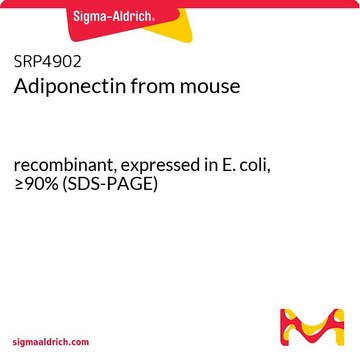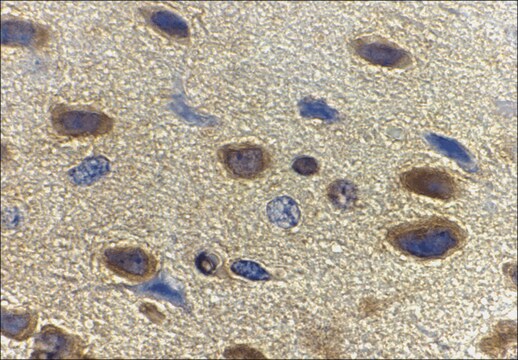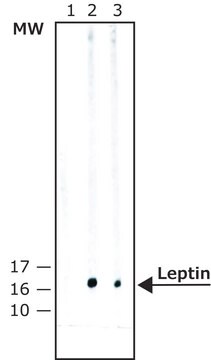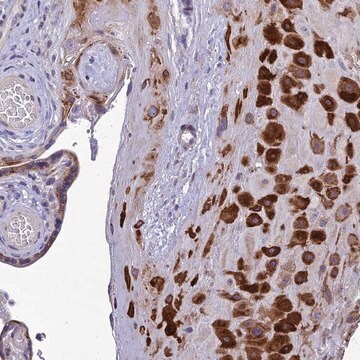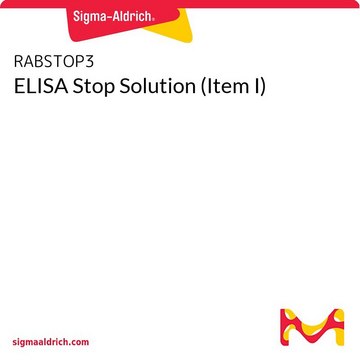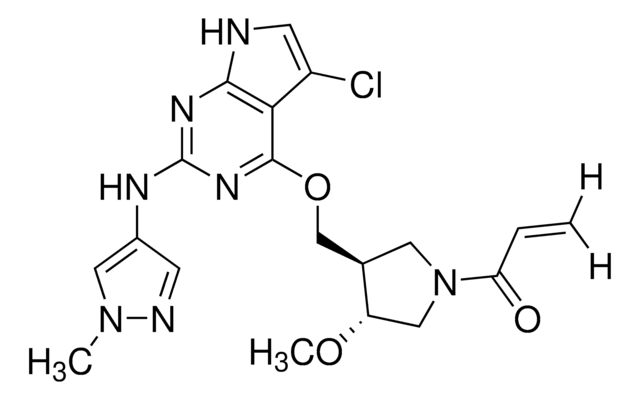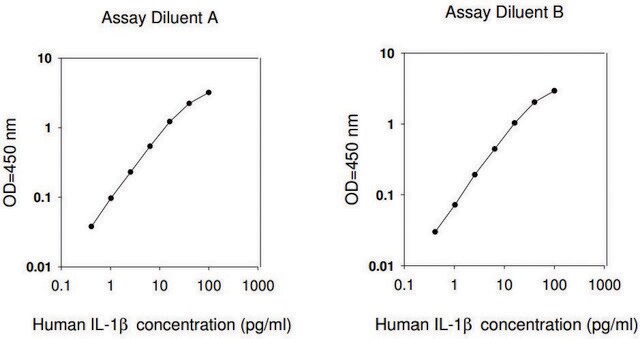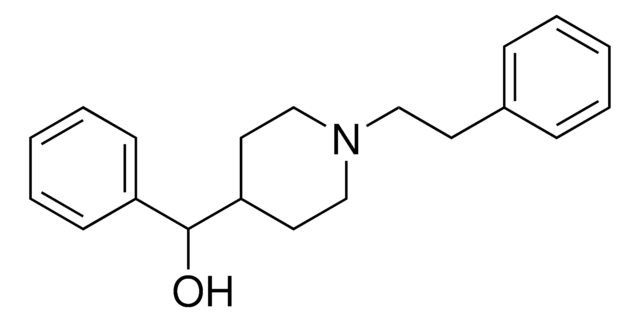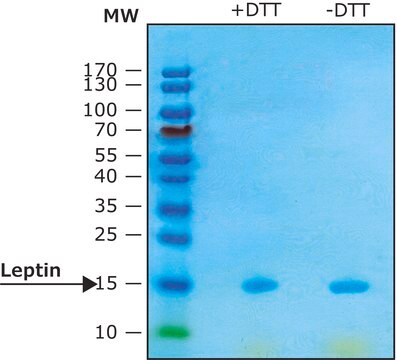推荐产品
生物源
rabbit
品質等級
共軛
unconjugated
抗體表格
affinity isolated antibody
抗體產品種類
primary antibodies
無性繁殖
polyclonal
形狀
buffered aqueous solution
物種活性
mouse, human
濃度
~1 mg/mL
技術
western blot (chemiluminescent): 0.5-1 μg/mL using using human plasma or placenta, or an extract of differentiated 3T3-L1 mouse cells.
UniProt登錄號
運輸包裝
dry ice
儲存溫度
−20°C
目標翻譯後修改
unmodified
基因資訊
human ... ADIPOQ(9370)
mouse ... Adipoq(11450)
一般說明
Adiponectin is secreted from adipose tissue for the regulation of glucose and fatty acid break down.
Anti-Adiponectin is produced in rabbit using a synthetic peptide corresponding to amino acid residues of human adiponectin. Adiponectin, also designated as adipocyte complement-related protein of 30 kDa (Acrp30), AdipoQ, apM1, Gelatin-binding protein 28 kDa (GBP28) is an adipocyte-specific protein that circulates in the blood stream, where it accounts for approximately 0.01% of all plasma proteins. Adiponectin belongs to the complement factor C1q family that belongs to the soluble defense collagen superfamily. Adiponectin (ADIPOQ) protein has a carboxyl-terminal globular domain and an amino-terminal collagen domain.
It is recommended to dilute the antibody in phosphate buffered saline containing 0.5% non-fat dry milk for background staining reduction.
特異性
Rabbit Anti-Adiponectin antibody recognizes human and mouse adiponectin.
免疫原
synthetic peptide corresponding to amino acid residues 225-244 of human adiponectin with N-terminal added cysteine, conjugated to KLH.
應用
Anti-Adiponectin antibody produced in rabbit has been used in western blotting and immunohistochemistry.
Applications in which this antibody has been used successfully, and the associated peer-reviewed papers, are given below.
Western Blotting (1 paper)
Western Blotting (1 paper)
Rabbit Anti-Adiponectin antibody has been used for immunohistochemical and western blot applications.
生化/生理作用
Adipose tissue has important roles in energy storage, glucose homeostasis and fat metabolism.(10) Increased adiponectin levels are associated with type I diabetes mellitus, anorexia nervosa, weight reduction, and chronic renal failure. Adiponectin (ADIPOQ) affects lipid catabolism by increasing fatty acid oxidation in muscle, modulates glucose uptake, alters liver gluconeogenesis and enhances insulin-sensitivity in both muscle and liver. ADIPOQ has anti-atherosclerotic and anti-inflammatory properties. ADIPOQ has a role in physiological processes such as energy homeostasis and obesity. Low levels of adiponectin are also linked with hypertension and dyslipidemia. Mutation in the gene encoding it is linked with risk for endometrial cancer.
外觀
0.01M 磷酸缓冲盐溶液,pH 7.4,含 15mM 叠氮化钠。
免責聲明
Unless otherwise stated in our catalog or other company documentation accompanying the product(s), our products are intended for research use only and are not to be used for any other purpose, which includes but is not limited to, unauthorized commercial uses, in vitro diagnostic uses, ex vivo or in vivo therapeutic uses or any type of consumption or application to humans or animals.
未找到合适的产品?
试试我们的产品选型工具.
儲存類別代碼
10 - Combustible liquids
水污染物質分類(WGK)
WGK 3
閃點(°F)
Not applicable
閃點(°C)
Not applicable
Pan-PPAR agonist beneficial effects in overweight mice fed a high-fat high-sucrose diet
Fernandes-SC, et al.
Nutrition, 25(7), 818-827 (2009)
Caroline Fernandes-Santos et al.
Nutrition (Burbank, Los Angeles County, Calif.), 25(7-8), 818-827 (2009-03-10)
We analyzed the effect of peroxisome proliferator-activated receptor (PPAR) agonists on adipose tissue morphology, adiponectin expression, and its relation to glucose and insulin levels in C57BL/6 mice fed a high-fat high-sucrose (HFHS) diet. Male C57BL/6 mice received one of five
Ashok Daniel Prabakaran et al.
Disease models & mechanisms, 11(3) (2018-02-13)
Although the existence of a close relationship between the early maternal developmental environment, fetal size at birth and the risk of developing disease in adulthood has been suggested, most studies, however, employed experimentally induced intrauterine growth restriction as a model
Weight Cycling Enhances Adipose Tissue Inflammatory Responses in Male Mice
Barbosa-da-SS, et al.
PLoS ONE, 7, e39837-e39837 (2012)
The inflammatory profile and liver damage of a sucrose-rich diet in mice
Oliveira LSC, et al.
The Journal of Nutritional Biochemistry, 25(2), 193-200 (2014)
我们的科学家团队拥有各种研究领域经验,包括生命科学、材料科学、化学合成、色谱、分析及许多其他领域.
联系技术服务部门